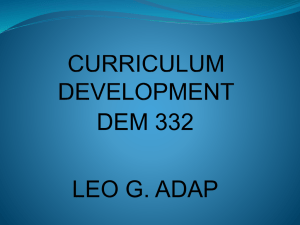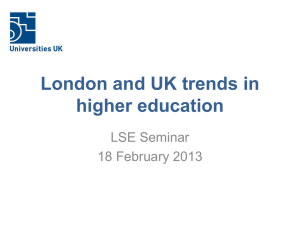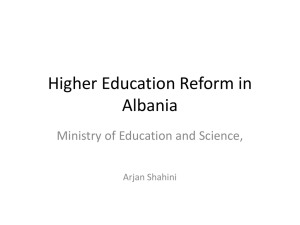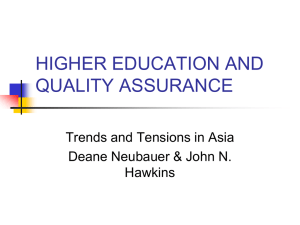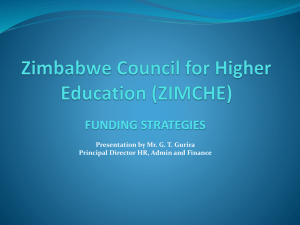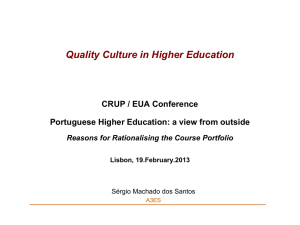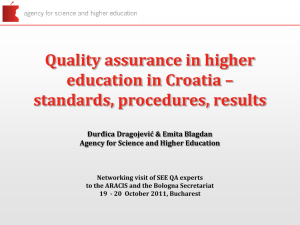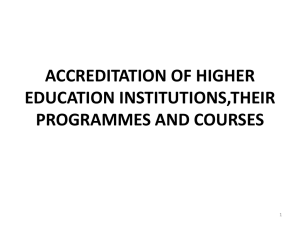The Context of Higher Education & Science
advertisement
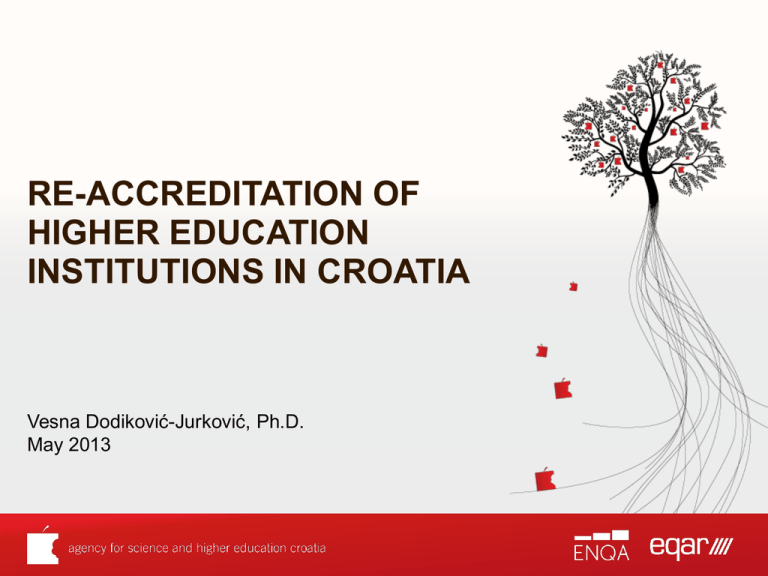
RE-ACCREDITATION OF HIGHER EDUCATION INSTITUTIONS IN CROATIA Vesna Dodiković-Jurković, Ph.D. May 2013 Overview • The context of Higher Education & Science in Croatia • ASHE • Re-accreditation • Challenges Map of Croatia The Context of Higher Education & Science The main stakeholders: • • • • • • • • • MSES - Ministry of Science, Education and Sports NCHE - National Council for Higher Education NCS - National Council for Science ASHE - Agency for Science and Higher Education SU - Students’ Union Rectors’ Conference The Croatian Council of Universities and University Colleges of Applied Sciences HEIs Scientific organizations The Context of Higher Education & Science • Number of HEIs: - 119 (88 public / 31 private) - 10 universities (7 public / 3 private) - 15 polytechnics / 27 colleges • Number of students: approx. 180 000 • Number of scientific organizations: 168 (25 public scientific institutes) Scheme of study programmes in Croatia Postgraduate university (dr.sc.,dr.art/PhD)., 3 years ECTS number regulated by university 8. Postgraduate professional (uni. spec.), 1-2 years Min. 300 ECTS Graduate (mag. struke/Master), 1-2 years 60-120 ECTS 7. 6. 5. 4. 3. Undergraduate (univ.bacc), 3-4 years 180-240 ECTS 2. 1. UNIVERSITY STUDY PROG. UNIVERSITIES YEAR INSTITUTION Specialist graduate professional (professional spec.), 1-2 years 60-120 ECTS Undergraduate professional (professional baccalareus/baccalaurea) 3-4 years 180-240 ECTS bodova (pristupnik/associate degree) <3 god. <180 ECTS PROFESSIONAL STUDY PROG. POLYTECHNICS & COLLEGES Croatian Qualification Framework Types of programs Levels 8 8.2. Postgraduate university study – PhD 8.1. Former Master’s Degree – 2 years 7 Postgraduate professional study Graduate university study Graduate professional study 6 Undergraduate university study Undergraduate professional study 5 Professional study – less than 3 years Training programs – training and additional education 4 4.2. Secondary education – 4 years + State Matura 4.1. Secondary education – 3 years + final exam 3 Secondary vocational education – 1-2 years 2 Vocational training 1 Primary school (8 years) Universities - 10 Polytechnics - 15 Colleges - 25 Type of study programmes professional study programmes university study programmes Type of study programmes Professional study programmes University study programmes 215 1122 Professional study programmes professional specialist graduate professional Professional study programmes Professional Specialist graduate professional Total 158 57 215 University study programmes undergraduate university study Integrated undergraduate and graduate university study graduate university study postgraduate specialist study postgraduate university (doctoral) study University study programmes Undergraduate university study Integrated undergraduate and graduate university study Graduate university study Postgraduate specialist study Postgraduate university (doctoral) study Total 364 40 387 208 123 1122 The beginnings – 1990s • HE system inherited from Yugoslavia • First legislative changes in 1993 – establishment of private HEIs enabled • National Councils (Science and HE) set up – strategic and external QA role Introduction of Bologna system in Croatia • 2001 Croatia signed the Bologna Declaration • Impetus - wish to improve the education structure of the population, reform the system, and join the EU • Mayor changes: binary system, three cycle system, ECTS • National Councils tasked with external QA • 2005 – first Bologna generation of students enrolled Agency for Science and Higher Education - ASHE • Established in 2005 • 2009 – redefinition of its role (Quality Assurance Act) and strengthening of its independence • Is a legal entity that autonomously and independently performs activities defined by Scientific Activity and Higher Education Act, Act on Recognition of Foreign Educational Qualifications and Act on Quality Assurance in Science and Higher Education • Unifies various activities related to the science and higher education system Organizational structure Activities 1. Quality Assurance Role 2. Collecting and analysing data on the systems of science and higher education 3. National ENIC/NARIC office 4. Central Applications Office 5. Support to work of various bodies 6. International cooperation QA role Initial accreditation Re-accreditation Thematic evaluation Audit Initial accreditation New HEIs and/or new study programs New scientific organizations established and/or financed by state Fulfilment of minimum criteria is checked Re-accreditation 5–year cycles All public and private HEIs by 2015/2016 All scientific organizations established and/or financed by the state by 2015/2016 Re-accreditation of HEIs All HEIs by 2015/2016 2010/2011: re-accreditation of 20 HEIs in the field of economics and business 2011/2012: re-accreditation of 32 HEIs in the technical sciences 2012/2013: re-accreditation of 9 HEIs in the biotechnical sciences + 14 private HEIs PROCEDURE Selfassessment Site visit Writing report Follow-up Re-accreditation Periodic external review Standards and criteria (key areas) Accreditation Commissions/Councils Self-review Trainings Peer-reviews Site-visit Report Follow-up Accreditation decision Outcome of accreditation Re-accreditation - Expert Panel ASHE coordinator + ASHE translator International Expert International Expert Student National Expert National Expert Re-accreditation - Scope MINIMUM CRITERIA • Prescribed by Ordinance of Accreditation of HE • teacher/student ratio 1:30 • space criteria 1 student per 1,25 m2 • 50/33 percent of study programmes conducted by teachers employed at the institution/own teachers MINIMUM CRITERIA For HE institutions registered in the Register of Scientific Organizations • Adopted long-term strategic programme of research in the area in which the teaching activity is performed • Adequate number and qualifications of employed researchers (appointed into scientific position or with an adequate number of scientific papers published) • Proof of adequate facilities and equipment for proposed research • Proof of necessary funds secured for proposed research QUALITY GRADE Standards and criteria of quality defined by Accreditation Council of the Agency 1 INSTITUTIONAL MANAGEMENT AND QUALITY ASSURANCE 2 STUDY PROGRAMMES 3 STUDENTS 4 TEACHERS 5 RESEARCH AND PROFESSIONAL ACTIVITY 6 INTERNATIONAL COOPERATION AND MOBILITY 7 RESOURCES: ADMINISTRATION, SPEACE, EQUIPMENT AND FINANCES QUALITY GRADE • Each standard consists of various criteria • Fulfilment of each criterium must be described with following levels of implementation: Not implemented Starting phase of implementation Partly implemented Mostly implemented Fully implemented CRITERIA/MEETINGS • Meetings are organized with: 1 2 Management Meeting with the working group that compiled the Self-Evaluation 3 Metting with representatives of the QA Unit 4 Teachers 5 Students 6 Non-teaching staff – tour of the facilities, etc. 1.Institutional Management and Quality Assurance Focus markers: • Mission • Vision • Systematic strategic planning • Organizational structure • Quality policy and procedures for quality assurance • Mechanisms for monitoring and improving teaching and research quality • Ethical behaviour Questions addressed to: management, QA department etc. 1.Institutional Management and Quality Assurance • 1.5. The institution has a quality policy and connected procedures for quality assurance and enhancement of all its activities. • Quality assurance unit – is it only formal? Internal Audit Scope → degree of development and efficiency of the internal QA system of HEIs ESG standards part I Integrated QA system (ISO+ESG) HEIs QA systems • • • • • 150 QA units are established at HEIs 126 QA Ordinances 57 QA Manuals 108 students members of QA units 35 representatives from business sector are members of QA units • Enhancement of quality culture Role of Students in QA system • Internal QA system at HEIs: – Part of governance body at HEI (Senate, Faculty board, SU, …) – Part of advisory body (QA Council, Board, Centre) – Participate in evaluation of QA system/procedures at • Institutional level • Programme level Role of Students in QA system • External QA system – Part of ASHE Accreditation Council – Part of experts panel (re-accreditation panel, audit panel) 2. Study programmes Focus markers: • Enrolment quotas – pass rate • Learning outcomes and assessment • Allocation of ECTS credits • Proposing new study programmes and revision of the existing study programmes • Teaching methods • Internship Questions addressed to: management, heads of departments, teachers, QA department, working group that compiled the self-evaluation etc. 3. Students Focus markers: • Admission criteria • Mentorship • Assessment • Alumni – track of the employability • Informing the public • Participation in decision-making processes and feedback about the measures implemented on the basis of their suggestions Questions addressed to: students, teachers, management etc. 4. Teachers Focus markers: • Number and qualifications of teachers • Encouraging development of teachers • Teaching workload Questions addressed to: teachers, management etc. 5. Professional and Research Activity Focus markers: • Priorities and procedures for expert and research activities • Cooperation with industry, businesses, S&ME • Advisory and professional activities Questions addressed to: teachers-researchers, assistants, management etc. 6. Mobility and International Cooperation Focus markers: • Mobility of students • Mobility of teachers/researchers • International networks, projects and cooperation Questions addressed to: management, students, teachers/researchers, representatives of international cooperation office, etc. 7. Resources Focus markers: • Resources: equipment, classrooms, laboratories etc. • Development of non-teaching staff • Equipment - in accordance with recognized international standards • Library, e-resources • Financial stability and transparency Questions addressed to: management, non-teaching staff, etc. Tour of facilities REPORTS Report on meeting minimum quantitative criteria (MOZVAG) Report with quality grade by the expert panel Accreditation Council Re-accreditation-outcomes ASHE makes recommendation to the minister of science, education and sports to: Issue accreditation (for institutions and/or programmes) Issue a letter of expectation up to 3 years (can result in denial of enrolment) Revoke the licence (for institutions and/or programmes) After expiry: After expiry: Issuing the licence Revoking the licence OUTCOMES IN PREVIOUS RE-ACCREDITATIONS 2010/2012 - Outcomes • Accreditation granted to 30 HEIs • Letter of expectation issued to 16 HEIs and 5 study programmes • Accreditation recommendation to revoke the licence for 4 HEIs/ appeal procedure underway • Revoke licence to 11 dislocated study programmes Strengths • ASHE is a member of ENQA and EQAR • External quality assurance procedures in line with the ESG, as well as European and international best practices • Public call for experts (peer reviews) • Foreign reviewers in the panels • Business representatives and students included in the Management Board, Accreditation Council, and review panels • NGO representative member of the Accreditation Council • Accreditation reports and decisions are public Strengths • Fair and equitable treatment of all stakeholders (public, private, new or traditional HEIs) • Involvement of all stakeholders in implementing changes and carrying out activities • Public discussions with all stakeholders • Public forum – ASHE website • ASHE documents are public (standards, criteria & procedures) • The Ministry clearly committed to independence of the national agency Strengths • Surveys • Confidentiality Statement – ASHE staff • Confidentiality and Conflict of Interest Statement (everybody participating in external QA procedures) • Accreditation Council Ethical Code • No gifts from HEIs, no paid lunches or dinners from HEIs (members of peer-reviews) – written procedure • ASHE annual report is public Challenges and Future • Further development of external QA procedures in line with the implementation of National Qualification Framework • Shift from "inputs" to "outputs" /more focus on learning outcomes and employment of graduates • Thematic reviews of "burning issues" in Croatian HE: doctoral education, learning outcomes… • Support to evidence-based policy making: focus on data collection Challenges and Future • Help our HEIs to enhance their position in EHEA and worldwide (mobility, cooperation with business) • Further support to development of quality culture: workshops, reports… • Strengthen regional and international cooperation Thank you Thank you for your attention! https://www.azvo.hr/index.php/en
